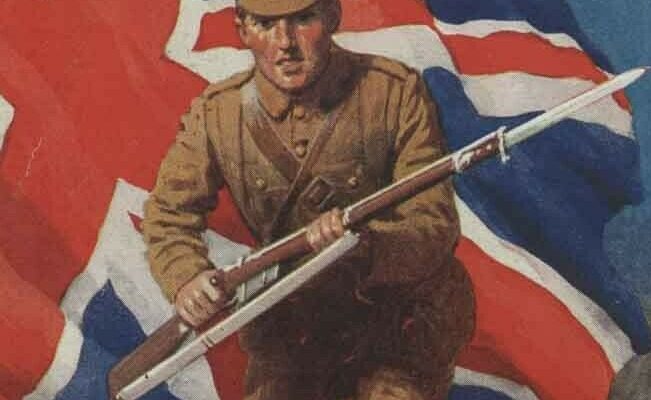Towards the end of February 1915 Melbourn Road echoed to the sound of two thousand aching feet.
The 5th Battalion of the Royal Welsh Fusiliers had marched the paltry thirteen miles from Cambridge (nothing compared to their usual route marches) and were to collapse that night into makeshift beds hastily found for them by the townsfolk of Royston.
The town at that time boasted just under 4,000 people, so the soldiers arrival proved a huge challenge.
Some few were billeted in the Workhouse opposite Therfield Heath and many others made use of the institution’s baths, going there ‘in batches in the mornings’.
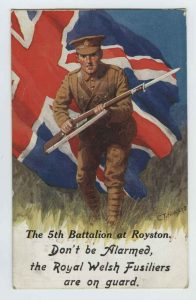
The Herts and Cambs Reporter & Royston Crow was soon to report, ‘everything is working as if a thousand or so men suddenly dropped into the town was nothing unusual. The inhabitants received them with open arms and hearts.’
To the west, the Heath proved perfect for both parades and training, while the soldiers threw themselves into town life: challenging the locals to football matches, running fund-raising events at the Cinema and joining the remaining members of the Town Band (those who had not already enlisted) to perform at the Cross.
Patriotic postcards – ‘Don’t be Alarmed, the Royal Welsh Fusiliers are on guard’ – were all the rage, and the local printers Charles and Robert Warren seized the chance to over-print some with the words ‘The 5th Battalion at Royston.’
One survives, apparently written by Charles’s servant at Holmdale, a house that still stands opposite the Heath.
Addressing it to a close female friend, the maid-servant wrote that the Welsh Fusiliers are ‘going to the front some time this month’, before complaining that things are ‘miserable at present but hope to get cheered up before the end of the week you know what I mean’.
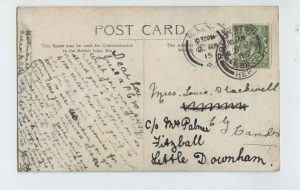
On Sundays the incomers swelled the congregations of all the local churches and Rev. J Lloyd Evans of the Kneesworth Street Congregational Church even gave an address in Welsh (having previously transferred from a church in the principality).
His church opened its schoolroom (the building which now houses Royston Museum) every evening as a ‘Soldiers Welcome’ to serve refreshments, as did the Methodist Church on Queens Road, and the ranks crowded in to play games, listen to music and pen their letters home.
As well as the lilt of the Welsh tongue, the soldiers brought with them a rather glorious goat that had been gifted to the Fusiliers by the King. The local paper reported:
‘The Battalion Mascot, a fine old goat with gilded horns, is beginning to know his way about and feeling quite at home. There is a confectioner’s shop not a hundred miles from the Cross which has a great attraction for him. He had been treated to biscuits and other good things from this shop on a few occasions, and now “Billy” when he comes off parade always wants to have a look in, and the goat major has difficulty in getting him by unless something tasty is forthcoming.’
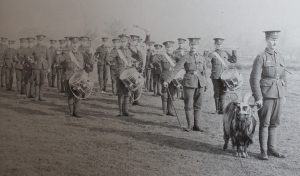
Throughout their stay, the men’s musical talent was in much demand. The first concert they gave at the Town Hall was packed out. So many people had had to be turned away that the concert was repeated that same week. The highlight of the evening was a twenty-strong Welsh Male Voice Choir.
That St David’s Day (Monday 1 March) the men celebrated by wearing leeks in their caps. Despite heavy snow and a thunderstorm, sports competitions took place on the Heath, a dance was held for the ranks in the Town Hall, while the officers enjoyed a formal dinner at the Bull Hotel.
On Monday 15 March, after spending five weeks in the town the troops were ordered to return to Cambridge:
‘The Battalion paraded in the White Bear meadow at 9 o’clock on Monday morning, and after inspection marched up Kneesworth Street, headed by the Bugle Band and ‘Billy’ the goat, and left the town via Melbourn Road. Hundreds of people were out in the streets to wave a farewell to the boys as they swung by.‘
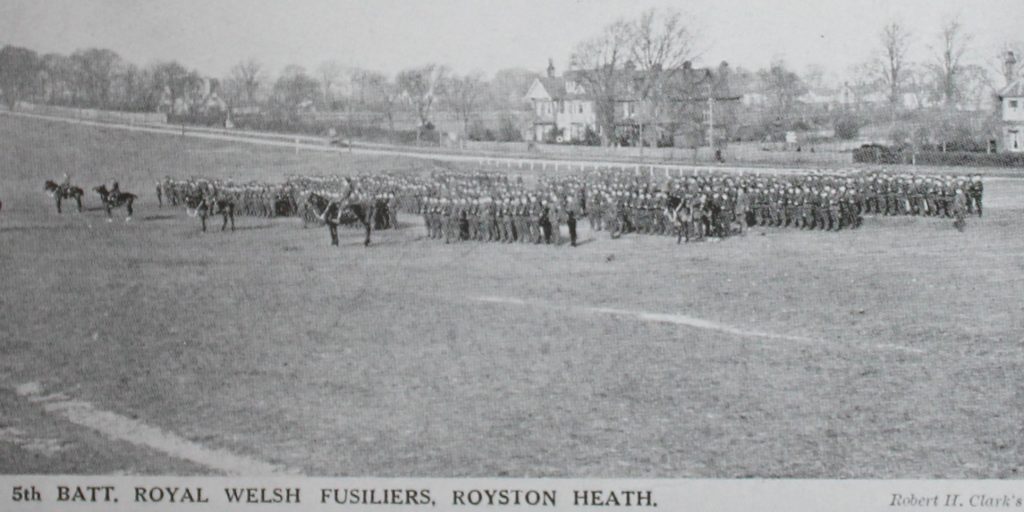
It was not the last that Royston was to see of the Welsh Fusiliers though. Before their marching orders had arrived, they had planned another concert and many returned that Thursday to fulfill the engagement.
During the interval Captain Elford H Roberts addressed the audience, ‘there was not a single man who would prefer to spend one week in Royston to three months in Cambridge…The kindness and courtesy they had received here in Royston stood far above that of any other place, and the officers and men would carry with them the happiest and fondest recollections of the place.’
The three concerts had raised £100 for the YMCA Coal Fund and the Royston Knitting club (who had already knitted 1,200 items for the troops).
The 4th Battalion of the Cheshire Regiment rapidly occupied the beds vacated by their Welsh comrades-in-arms. (If the good folk of Royston had thought 1,000 troops was a lot to accommodate, they now had to billet three times that number as the war rumbled on).
The stay of the Welsh Fusiliers was recalled with much fondness and many in the town were shocked to read on 23 August that their Colonel and other officers had been killed fighting the Ottomans. Ernest Flam wrote to the Flintshire County Herald, “I cannot tell you how deeply Royston is moved by the news conveyed in “The Times.” We in Royston loved your boys, and feel we have lost some of our own…we all are awaiting the casualty list with great apprehension.’
On the Welsh borders anxious parents also scoured the daily papers for news of their sons. Hawarden Parish Magazine reported ‘They know, from the published list of casualties among officers of the Battalion, that they have been in action at the Dardanelles, but so far have not learnt anything of their fate.’
The 53rd (Welsh Division) had come ashore on 8 August at Sulva Bay as part of a landing that had started two days earlier. Those initial troops were pinned down by the Ottomans (with Mustafa Kemal Atatürk, founder of the modern sate of Turkey, at their head) who sniped at the beaches from positions in the surrounding Anafarta Hills.
When Private Arthur Jones did write home, he explained that many, like him, had been wounded on the same day that the Battalion’s Colonel had fallen.
“We were fighting on the latest landing, and it was simply ******* and no trenches to take cover. We had to lay flat on the ground to fire when we were advancing. We were advancing under cover of our Navy’s fire, and it is practically all bayonet work we did until I got wounded. The Turks do not like the bayonet whatever…They are up to all kinds of tricks to try to drive us back. About seven o’clock on Tuesday night, August 10th, the Turks came up with their hands above their heads, as if they wanted to surrender. They were mostly dressed as Indian troops, but we could see it was another trick of theirs, so we waited until they got about 40 yards from where we were lying, and then poured hell into them. Well, there was not one of them alive five minutes afterwards.”
Necessary defence, or war-crime? Whichever, it went unreported in Royston.
Worried, the man who would be partly responsible for the planning of Royston’s War Memorial, Walter Titchmarsh wrote to the editor of the Flintshire County Herald to express his sorrow that ‘the Battallion had had such a rough time at the Dardenelles’.
He was keen to hear the fate of those men who had been billeted in his house but it would not be as bad as he had feared. Of the seven he listed, at least four survived the war to be issued with their campaign medals.
No mention was made in the Casualty Lists of the fate of Billy, Royston’s favourite gilded goat.
Sources
- Cambridge Independent Press – 26 March 1915, 30 April 1915
- Herts & Cambs Reporter – 19 February 1915
- Flintshire County Herald – 5, 12, 26 March 1915, 3 September 1915
- The Times – 23 August 1915
